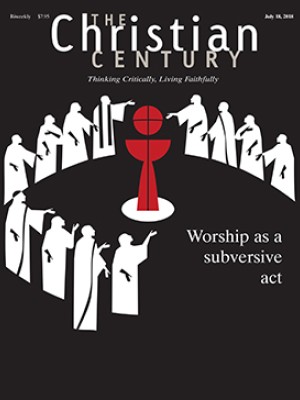August 5, Ordinary 18B (John 6:24-35)
I have an enduring memory of bread I ate when I was four. Jesus' bread also abides.
When I was a prekindergartner, my grandmother would take me regularly to one of the ethnic enclaves in Baltimore for some shopping. The highlight for me was always a stop at a Polish-Jewish bakery—not for the desserts, as luscious as they must have been and as tempting to four-year-old me, but for something far more inviting: a particular kind of bread.
It might have been the aroma; it might have been the sound it made when it was thumped or the odd little paper stamp affixed to its side or the touch of my grandmother’s hand in mine while we stood in line. Probably it was all of these things. One specific loaf: dark and round and pleasingly firm and crusty on the outside, dense and with just the right holey-ness inside. It squished pleasingly between my fingers and then bounced right back into position. And the taste of it and the feel of it against my teeth were sensations for which I had no words then or now. Although I’ve sometimes looked for it when out and about, I’ve never been able to find that precise kind of bread. The reality of that bread, and of that set of experiences, abides.
Read our latest issue or browse back issues.
Memory goes a long way toward making us who we are. It reminds of our roots, of who has shaped us, of the events and people who have helped to form our values and our beliefs and our ability to trust and to love. It may even, with a little imagination, point us to our futures. And the strongest of memories, triggered by the senses, tend to endure. They stay with us throughout our lives, the best of them as comfort.
My memory of the bread leads me to wonder about the crowd that tracked Jesus down. He’d apparently fed some of them a scant few verses ago and then escaped their enthusiasm for making him king. Now that they’ve found him, he seems to assume that they’re back for more. It’s not surprising; many of Jesus’ followers were probably peasants, plodding through lives marked by scarcity. Food was basic and not always readily to hand, so a handout from an extraordinary stranger must have been outrageously unexpected and appreciated. Who was that guy, and where are the leftovers?
I wonder if that’s it, though. Do the food and Jesus’ prodigal generosity constitute the entirety of their urge to seek him? After all, it takes some time and effort to find him. I wonder if this relentless search is more the product of their memory—not just of a gratuitous lunch when they were hungry, but of a nurturing presence they never knew before and for which they long. Their ancestors, as Jesus reminds them, also received the gift of food in the precarious environment of the desert, from a beneficent and unexpectedly nurturing God who promised to be with them for the duration.
Jesus, understanding their need better than they, introduces his reinterpretation of the manna story from Exodus with a remark about the sturdiness of the bread that he gives. Like the water he offered to the Samaritan woman at the well back in the fourth chapter of this Gospel, this bread lasts. Most English translations of the Bible use the verb endures to characterize the bread (v. 27), but the author of the fourth Gospel chooses a more nuanced word to capture the uniqueness of the bread: the Greek word menō, sometimes translated “abide.” The word conveys more than a finite durability; there is a trace of eternity here.
The author of the fourth Gospel is quite fond of this word; in fact he uses it more often than any other writer in the New Testament canon. Menō is found tucked into all sorts of places, beginning in chapter 1 at Jesus’ baptism, when we are told twice that the Spirit remained (menō) on him. Most often, the word is used to describe the intimate, enduring, reciprocal, personal relationships of the Spirit and the Father with Jesus. The extended metaphor of the vine and branches in chapter 15 is awash with the word, and there its usage describes the relationship between Jesus and the disciples.
It is intriguing and not coincidental that this word is found describing the action of food. But of course, we know—and the crowd around him will soon learn—that the bread of which he’s been speaking was never really bread, was not the stuff they ate earlier in the chapter. Before we even get to the vine and the branches—another food metaphor—he’s already speaking of himself and the intimate relationship he offers. He is the sustenance that nourishes and sustains; his is the presence that sticks. As he goes on to say, “whoever eats this bread will live forever; and the bread that I give for the life of the world is my flesh” (6:51).
It is no wonder that on the occasion of a funeral we so often sing a variation of this section of the Gospel. Our memories of the loved one are so poignant at those times, and the promise that Jesus extended so long ago to his disciples hangs in the air, fragrant and comforting as the memory of good bread.





